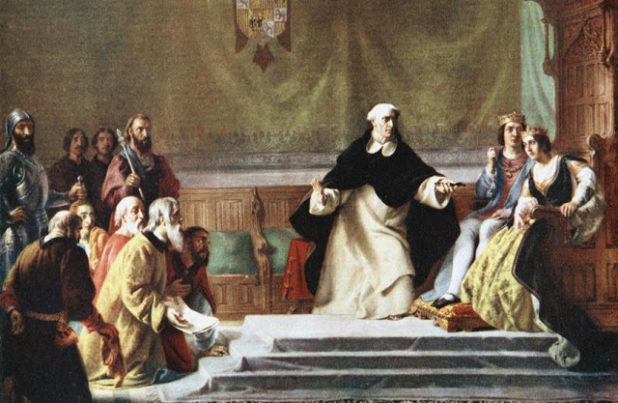Diversity Macht Frei
January 22, 2017
Jews beg mercy from the Catholic Monarchs, Ferdinand and Isabel.
Why are Jews hated? “Because of antisemitism” is the tautological answer of the Jews. This is like saying “Why did the rocket blow up? Because there was an explosion.” It is an evasive non-answer. Some insight into a real answer can be gleaned from this extract from the book The Disinherited by Henry Kamen, in which he discusses the expulsion of the Jews from Spain by the Catholic Monarchs, Ferdinand and Isabel.
BEGIN CITATION
Converts or their descendants had been known as ‘conversos’ or ‘Marranos’ since the fourteenth century, when widespread riots in 1391 had forced tens of thousands of Jews to become Christians. They retained many of their traditional customs regarding family life, sociability and diet, and continued by preference to mix among themselves rather than with ‘Old Christians’ of non-Jewish origin. In a previous age this might have been overlooked as harmless. However, the times in the 1490s were different and there were always neighbours or clergy who objected to quasi-Jewish customs as ‘heresy’. The tendency of conversos to stick together (especially for marriage) also aroused social and political enmity. As a consequence, though Jews and Judaism had disappeared from Spanish soil, the phenomenon of anti-Semitism was very much alive, for conversos were perceived as crypto-Jews even though little evidence may have justified it.
A factor that undoubtedly contributed to tension was their claim to have a separate identity. Already a powerful minority in southern Castile by the mid-fifteenth century, they were secure of their social position and proud to be both Christian and of Jewish descent. As many of their own writers affirmed clearly, they were a nation. They had their own individuality, and took pride in it. The chronicler Andrés Bernáldez reported that ‘they entertained the arrogant claim that there was no better people in the world than they’. The writer Alonso de Palencia reported complaints by Old Christians that the conversos acted ‘as a nation apart, and nowhere would they agree to act together with the Old Christians; indeed, as though they were a people of totally opposed ideas, they openly and brazenly favoured whatever was contrary to the Old Christians.’ Implicit in the attitude was the claim that they were even better than Old Christians, because together with Christian faith they combined direct descent from the lineage (linaje) of Christ.
Converso separateness had a certain logic. The large number of converts after 1391 could not be easily fitted into existing social structures. In Barcelona and Valencia in the 1390s they were given their own churches, in each case a former synagogue. They also set up their own converso confraternities or church guilds. In the Crown of Aragon they called themselves proudly ‘Christians of Israel’. They had their own social life and intermarried among themselves. These converso attitudes were probably created by self-defensiveness rather than arrogance, but they contributed to the wall of distrust between Old and New Christians. In particular, the idea of a converso nation, which rooted itself irrevocably in the mind of Jewish Christians, made them appear as a separate, alien and hostile entity. This had fateful consequences.
…
In many large towns of southern Spain, such as Toledo, Seville and Cordoba, conversos were numerous enough to carry political weight, and even to control the city council. Enmities and rivalries picked on the issue of ‘race’ as a sticking point, and the ambiguous religious practice of the conversos sparked off a vigorous controversy. Some members of the clergy, backed up by others who were motivated by political or social rivalry, accused conversos of being ‘false’ Christians who aimed to gain control of the country. Disputes over the matter went on for over a generation, until in 1478 Ferdinand and Isabella set up, with the pope’s help, a new judicial tribunal, the Inquisition, whose principal task was to investigate whether the conversos were indeed ‘heretics’, as many alleged, or ‘true’ Christians. The tribunal in its first years acted with unprecedented severity (usually – as we shall have occasion to comment later – through arrests and punishments, accompanied by a few executions), but failed to solve the matter adequately. Eventually the inquisitors came to the opinion that it was the continued presence of the small Jewish population that encouraged the conversos to cling to their ‘heresy’. They accordingly persuaded the crown that the right step was to expel all Jews from Spain. Ferdinand and Isabella issued a decree to this effect on 31 March 1492, while they were in the city of Granada, newly conquered from the Muslims of the south of Spain.
There were substantial variations in the texts sent to different parts of the country, but the basic message was the same: We order to be expelled and do expel from all our realms and lordships both west and east all Jewish males and females, both adults and children, that dwell in the said realms and lordships. The order gave the Jews until the end of July to leave the country, and decreed death and confiscation of goods for those who returned. The move was not unexpected, for there had been small local expulsions since at least 1480, when some towns in the south of Spain made Jews move out and live somewhere else. Anti-Jewish pressure in Spain was by no means exceptional, and fitted into a pattern common to the rest of Europe. In late medieval times, Jews had been expelled by England and by France. Towards the end of the fifteenth century other Mediterranean states such as Provence, Parma and Milan also resorted, like Spain, to expulsion.
END CITATION
One of the myths that Jews like to cultivate is that their departure from Spain impoverished the country and left it in a parlous state. Kamen points out that this is false.
The expulsions of 1492 had no negative economic consequences. Jews, especially after 1391, had played only a small part in the country’s economy, and their disappearance after 1492 had a similarly small impact. In some towns there was for a time a shortage of doctors, a profession in which Jews had been prominent, but the lack was soon remedied.
 Daily Stormer The Most Censored Publication in History
Daily Stormer The Most Censored Publication in History



